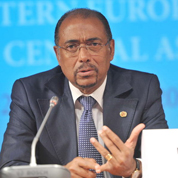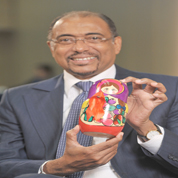UN’s ardent advocate for a world free of HIV and related problems

An outspoken campaigner for global health, Michel Sidibe, the executive director of the Joint United Nations Program on HIV/AIDS (UNAIDS), describes his job at the UN as “a mission tasked with creating a world free of HIV and related socio-medical issues”. In this interview, given at the sidelines of the International MDG-6 Forum in Moscow, Sidibe, who also doubles as the UN under-secretary-general, highlighted UNAIDS’ efforts and measures to achieve the MDG-6 goals across the globe.
How would you assess the current situation with HIV incidence in Russia and other former Soviet republics, and are you satisfied with the state of affairs on HIV/AIDS issues in these countries?
This is a very good question. Indeed, I can tell you that after the G8 Summit in St. Petersburg, the Russian government took a very resolute decision to address the issue of HIV by increasing the number of HIV treatment facilities and the patients coverage by 12 times in over 5 years. Also, also serious measures were taken to increase protective measures for pregnant women with HIV or at risk for HIV so as to reduce the number of newborns with this disease. But despite these positive efforts, I would like to note that this is not the time for complacency, because the post-Soviet region has continued to remain the only part of the globe, where the rate of new HIV infections is on the rise, thus making this region the fastest growing epidemic zone in the world today.
Do you really think that the targeted MDG-6 goals and objectives are achievable on the global scale, and if yes, do you see Russia and other post-Soviet states among those meeting these targets?
Yes, I do. Especially, after events that took place at our MDG-6 Forum’s Plenary Session this morning have given me more hope. I’m now fully convinced that when the political will of our leaders is in place, we can achieve all the MDG-6 objectives, both globally and in the post-Soviet space. Today, UNAIDS is ready to work together with the governments of Russia and other post-Soviet states to ensure that by 2015 no new babies are born with HIV in this region and also keep their mothers alive.
“I’m fully convinced that when the political will of our leaders is in place, we can achieve all the objectives set out within the MDG-6, both globally and in the post-Soviet space.”
For me, this is a very important goal, which I’m sure is fully attainable within the stipulated timeframe. This means the beginning of a new generation of children born without this disease. Secondly, UNAIDS will also work with the Russian government to ensure a zero transmission rate among drug users, and finally, help prevent deaths from HIV/TB co-infections. These are all practical goals, whose achievement will certainly help reverse the current epidemic trends in this region.
Today, the world is going through an economic crisis that is forcing governments to reduce spending. How can UN encourage countries not to cut their funding for anti-HIV programs?
It is very important for everyone to understand that we are currently passing through a difficult global economic crisis. It will be naive to neglect this factor. However, by trying to optimize expenditures via budgetary cuts to  combat crisis, governments should at the same time ensure that such inevitable adjustments have ‘a human face.’ Besides, the focus today should be placed on proactive measures, seeking new sources of funding for programs aimed at fighting HIV. At the MDG-6 Forum, I spoke about shared responsibilities based on shared values. I think these shared responsibilities should be taken seriously. This means big countries and so-called emerging nations like China should play much larger roles in funding global social issues. Similarly, so-called developing countries should also try within their limited means to allocate domestic resources. Finally, we should try to always maximize whatever resources are available to achieve better results via more transparent mechanisms. In other words, we should ensure that all implemented programs produce more benefits for people with HIV and related problems.
combat crisis, governments should at the same time ensure that such inevitable adjustments have ‘a human face.’ Besides, the focus today should be placed on proactive measures, seeking new sources of funding for programs aimed at fighting HIV. At the MDG-6 Forum, I spoke about shared responsibilities based on shared values. I think these shared responsibilities should be taken seriously. This means big countries and so-called emerging nations like China should play much larger roles in funding global social issues. Similarly, so-called developing countries should also try within their limited means to allocate domestic resources. Finally, we should try to always maximize whatever resources are available to achieve better results via more transparent mechanisms. In other words, we should ensure that all implemented programs produce more benefits for people with HIV and related problems.
In your learned opinion, which of the MDG-6 objectives would you advise the Russian and other CIS governments to pay attention to as a topmost priority issue?
I would say the elimination of HIV and related issues. I think the Russian government has all the necessary capabilities and resources to completely phase out this problem both in this country and across the whole of the post-Soviet region by addressing, as I’ve already noted, the issues of people using injection drugs. However, to achieve this objective, the CIS governments need a very realistic program based on accumulated scientific knowledge on HIV and experiences of other countries that had passed through this stage in their national fights against HIV.
What is your assessment of the role of the Global Red Ribbon Movement in helping disseminate information on HIV, its prophylaxis and treatment in the world?
Prevention of HIV is very important because today two new people are infected for each person placed on anti-HIV treatment.
“Today, the Russian government has all the necessary capabilities and resources to completely phase out the problem of HIV and related issues both on its territory and across the whole of the post-Soviet region.”
Following up on the previous question, how would you assess the role of celebrities such as movie, sports stars, etc., in promoting the Global Red Ribbon Movement’s objectives?
Their role is very critical. They are bridge builders between us and the youth, the advocates and amplifiers of our collective voice. If one takes into consideration that fact these celebrities are easily connected with the youth, then you can fully understand the impact they make on them, especially as it is mainly younger people that more frequently get infected with HIV. Therefore, through the celebrities we want to make the youth more active participants in the fight against HIV and in the ongoing process for a change.
As a rule, at the end of our questions, we always give our guests the opportunity to highlight issues omitted during interviews. In this regard, what more would you like to highlight on other MDG-6 goals?
Thanks for this opportunity. I only would like to note that HIV and other MDG-6 objectives are all about social issues. Therefore, if we do not deal with the social determinants at the roots of these problems — such as the generally poor position of women in our society, social injustice, uneven distribution of resources and opportunities, etc. — then we shall not succeed in our ongoing fight against HIV and other related issues across the globe.












 Web design,
Web design,